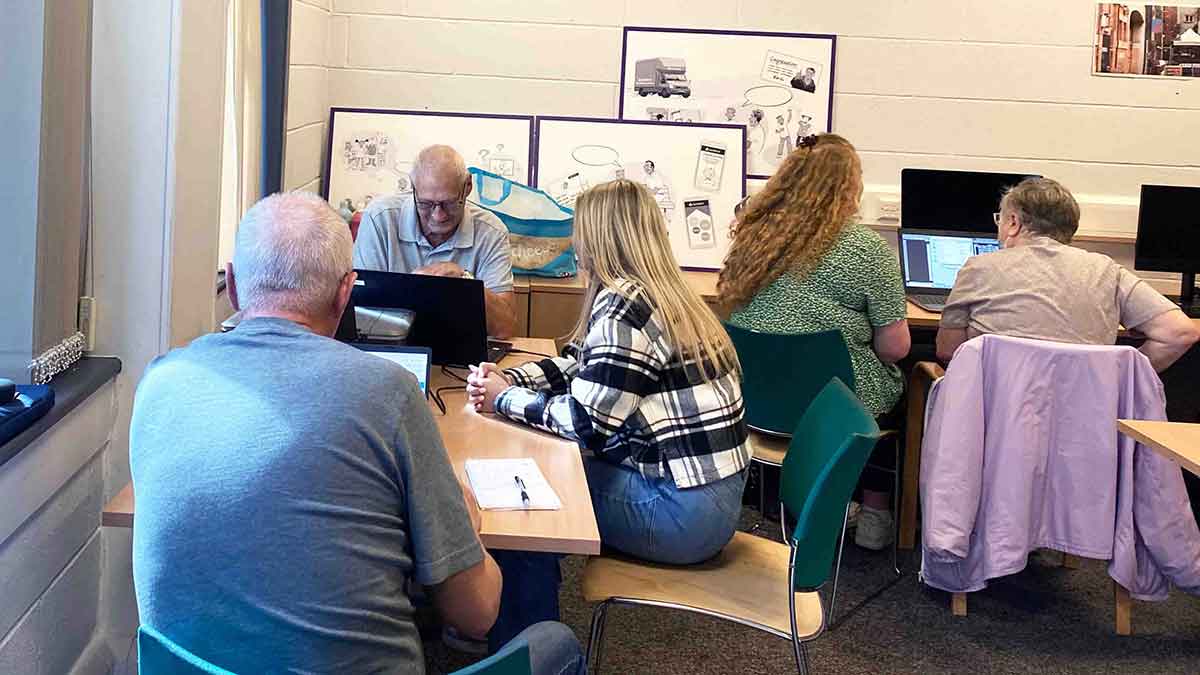Insights
How the circular economy supports sustainability by reducing tech waste
5 minutes
21st February 2024
Share this article:
Every year the world generates 50 million tonnes of tech or electronic waste (e-waste), with only 20% of discarded electronics set aside for reuse or recycling.
Unfortunately, the majority of old devices end up in landfill sites or are informally dumped – often in developing countries – which can in turn pollute the soil. Discarded mobile phones make a major contribution to the volume of tech waste; a staggering 5.3 billion devices are discarded each year.
One way we can help reduce e-waste is to develop initiatives based on the principles of the circular economy, where we can reuse or recycle devices in a sustainable way.
Introducing the circular economy
The circular economy has been defined as as a model of production and consumption, which involves sharing, leasing, reusing, repairing, refurbishing and recycling existing materials and products for as long as possible.
The benefits of the circular economy are numerous, covering environmental, social and economic areas. Perhaps the most obvious is the ability to reduce the carbon footprint and help on the journey to net zero.
There are examples of the circular economy across multiple industry sectors, from start-ups building businesses on great ideas, to established players tweaking their business model.
UK-based brewery Toast Ale brews craft beer that is made from surplus bread collected from delis and sandwich makers that would otherwise go to waste.
IKEA has been experimenting with opening stores that focus on selling second-hand furniture, extending the experiment following early success.
How the circular economy is tackling tech waste
There’s also many inspiring examples of businesses and initiatives based on circular principles that aim to reduce our annual tech-waste mountain.
Canadian technology firm Excir has created technology to rapidly extract precious metals from e-waste, including gold. They’ve even partnered with the Royal Mint to recover metals from circuit boards of discarded laptops and mobile phones at a site in South Wales.
The Renault Group is transforming it’s manufacturing plants at Flins, France into the Refactory an automotive factory built on circular economy principles with a CO2 neutral target. As part of the project, it has created a special lab that retrofits industrial robots, to extend their life.
But reducing tech waste via the circular economy isn’t just for highly niche start-ups. For example, our O2 Recycle for Business scheme makes it easier for any organisation to reduce their electronic waste.
We’ll pay for your unused devices and then reuse, repair or recycle them; we have a zero-landfill policy and by the end of 2025 we aim to recycle 95% of this waste responsibly and fulfil 10 million circular actions.
The social and economic benefits of the circular economy
The circular economy also has a range of valuable social benefits. Goods that are reused create opportunities for inclusion, for example, the redistribution of refurbished mobile devices to those who need them most.
Our own Tech Donation programme, organised in partnership with Hubbub and Community Calling, has proved popular, offering opportunities for organisations to provide devices and connectivity to digitally excluded children and over-65s in the UK. This has proven to be a critical lifeline for many, helping children get the education they need and welcoming older folk into the digital age.
The scheme has enabled employees at companies like Capita to send over 2000 old devices to be wiped and then recycled or redistributed to those in need. That’s 2000 more people who are now connected to the digital world.
And there are wider economic and business benefits too. It has even been estimated that the circular economy could create nearly half a million new jobs in the UK by 2035, which is good news for everyone.
Making a positive impact
By reducing tech waste and joining tech donation programmes, organisations can make progress with their sustainability journey and make a positive social impact, helping those with little or no online access throughout the country.
And it seems to be happening.
Our research shows that 87% of organisations are already taking steps to support social causes, and 73% say that social value has grown as a priority in the last year.
And consumers think it’s important too. 55% say they were more likely to support a company that offers products and services tied to a tangible social impact, and 54% say a company’s commitment to ESG areas influences buying decisions.
But there is a lot of work to do. Nearly half of organisations (48%) rate their understanding and contribution to social impact as low.
How can organisations contribute to the circular economy?
In our view, there are a number of ways that organisations can contribute to the circular economy and help some of the most vulnerable in society at the same time:
- Take advantage of products and services that embody those principles, such as O2 Recycle for Business, and start to reduce tech-waste.
- Rethink processes that could help reduce wastage and make a tangible contribution to net zero. Again, reducing tech waste is a great area to start.
- Create new products and services. These could range from brewing beer from stale bread to retrofitting robots.
- Form new partnerships across private and public sectors to develop ideas, approaches and even services that support the circular economy, for example working with your supply chain. And identify the opportunities to support those in the most need.
New ways to operate
Throughout this series, we’ve seen some exciting examples of how new rental-based business models are transforming the way we do business.
We’ve looked at the wider rental economy, how everything-as-a-service has changed the way we acquire tech, and how the circular economy is supporting the environment and communities by reducing e-waste.
As we adopt these initiatives, we can pave the way for a more flexible and efficient future. By embracing access over ownership, we can reduce waste, optimise resource utilisation, and drive innovation that benefits organisations, the environment, the economy and – most importantly –communities that need it most.
Device as a Service: A more sustainable way to give your teams new devices.
0800 064 3790



